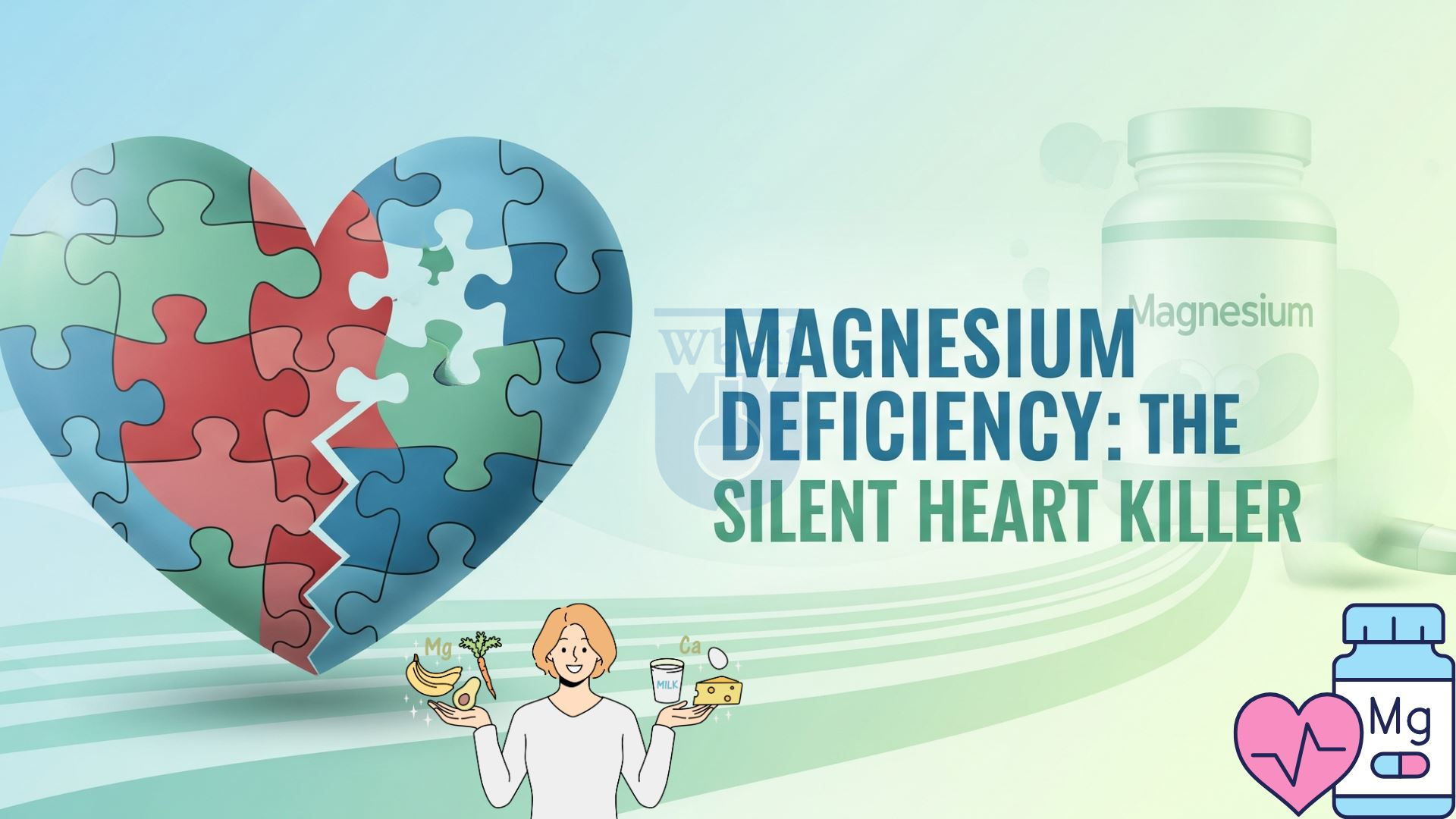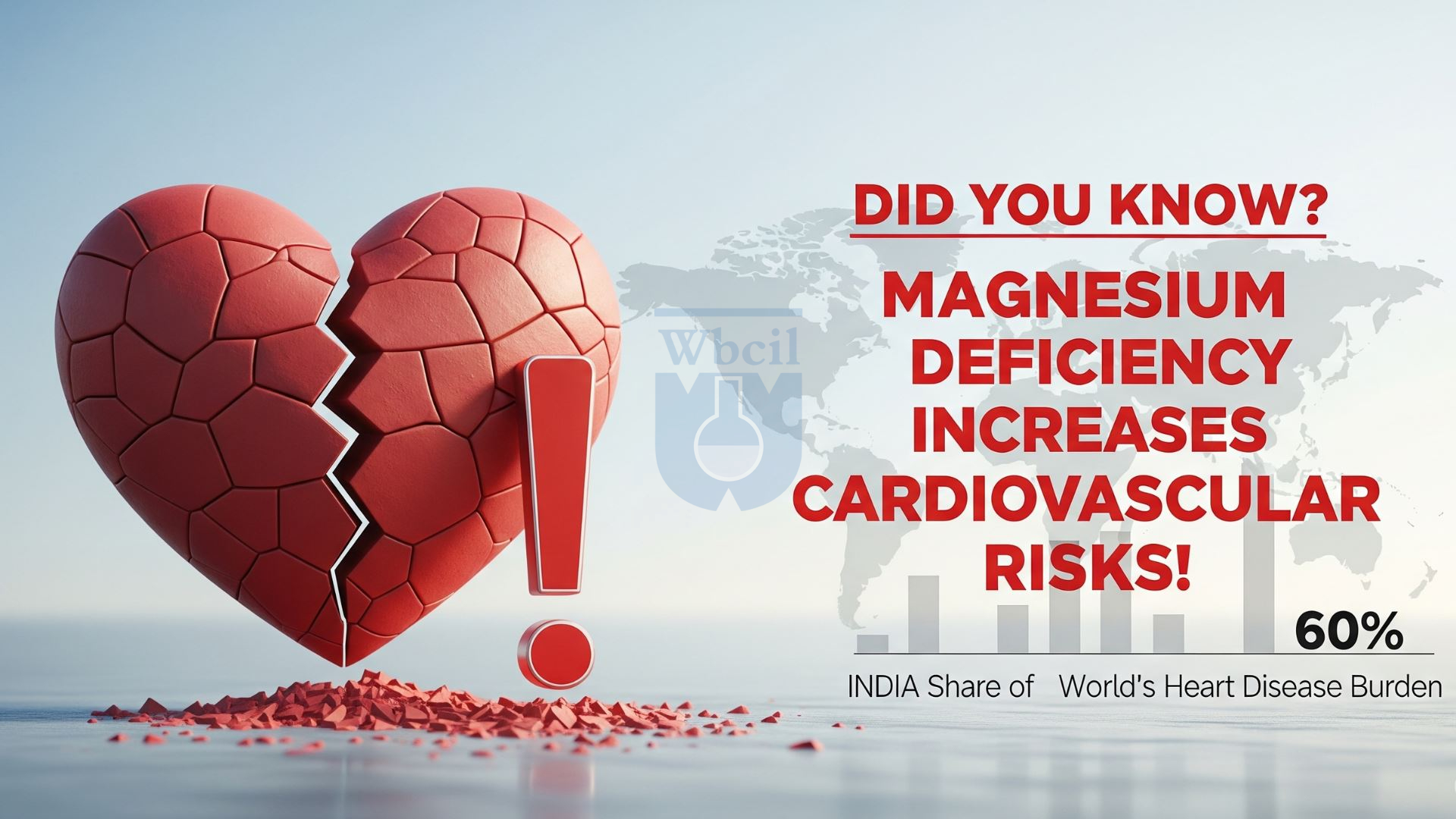How Magnesium Deficiency Endangers Your Cardiovascular Health: A Silent Heart Killer?
Introduction: A Heartfelt Wake-Up Call
Think of your heart as a never-ending engine that powers all of your bodily vessels. My uncle, a lively 45-year-old, was taken by surprise when he suffered a heart attack a few years ago. The diagnosis of cardiovascular issues evolved from what started out as exhaustion and sporadic palpitations. The underlying reason behind his recovery was found to be due to a deficiency in magnesium. This experience sensitized me to the subtle threats to cardiovascular health inherent in our modern diets and lifestyles.
As per the World Health Organization, cardiovascular disease is an emerging epidemic in India, claiming more than 4.77 million lives annually. Heart disease is unfortunately impacting younger individuals; in India, 25% of heart attacks are experienced by this age group below the age of 40. In the midst of this crisis, magnesium deficiency, a lesser-known epidemic, subtly undermines cardiovascular health. This blog takes a look at the important role of magnesium in heart protection and how this unsung hero of a mineral could be the cardiovascular system’s best friend. Magnesium is game-changing for heart health by avoiding palpitations and regulating blood pressure. Let’s take a closer look at why magnesium deficiency treatment is so important to foster long-term cardiovascular health and avoid heart disease.

Recognizing Cardiovascular Health and Its Current Issues
The State of Heart Health Today
The foundation of a successful life is cardiovascular health, but it faces previously unheard-of difficulties. 17.9 million deaths globally are caused by cardiovascular diseases annually, with India taking an undue burden of the disease. It is particularly alarming that cardiovascular diseases are increasingly being diagnosed in young individuals. Heart disease rates are through the roof because of inactive lifestyles, processed foods, and constant stress. Nutrition plays a crucial role in cardiovascular health, but modern-day diets are often devoid of essential minerals such as magnesium, thus increasing the risk of magnesium deficiency and cardiovascular disease.
Why Traditional Approaches Fall Short
Medication, exercise, and a low-fat diet are old-fashioned cardiovascular health measures that often fail. These therapies are effective, but they overlook the critical role played by micronutrients such as magnesium. As high as 50% of individuals in developed nations, including India, have magnesium deficiency, a silent epidemic. As a result of soil depletion and dependence on processed foods, most Indians take much less magnesium than dietary guidelines suggest daily, 300–400 mg. As a result of the difference, magnesium is a vital but underappreciated weapon for heart health.
Magnesium: Cardiovascular Health’s Unsung Hero
Why Is Magnesium Important for Your Heart?
Make magnesium the conductor of your heart’s orchestra, ensuring each beat is in sync. Magnesium maintains cellular production of energy and electrolyte balance both of which are necessary for the functioning of cardiac muscles.
Magnesium is vital for cardiovascular function since it opens up blood vessels, reduces inflammation, and regulates heart rhythm. Your heart cannot work effectively if you lack magnesium, increasing your risk of hypertension and arrhythmia.
There is evidence to support magnesium’s role in preventing heart disease. Elevated magnesium consumption reduced cardiovascular mortality by 10%, a 2018 meta-analysis in the American Journal of Clinical Nutrition reports. Supplemental magnesium is linked to reduced risk of heart disease, Harvard Medical School research found. Vasodilation, anti-inflammatory effects, and resistance to oxidative stress are some of the ways through which magnesium maintains cardiovascular well-being. These findings confirm the increasing enthusiasm for magnesium’s role in the prevention of heart disease in the medical fraternity.
A Hidden Danger to Your Heart: Magnesium Deficiency
Cardiovascular function is undermined subtly by magnesium deficiency. Because of poor nutrition and stress, prevalence is high, and urban Indians are particularly at risk. Cardiovascular function is affected directly by manifestations like fatigue, muscular cramping, and palpitations. Risk factors include alcoholism, diabetes, and diuretic use. Routine blood tests often do not identify magnesium deficiency, and thus diagnosis is challenging. Despite being used less often, specialized tests like red blood cell magnesium are more precise.
How Your Heart Is Protected by Magnesium
Regulating Blood Pressure and Stopping Hypertension magnesium calms blood vessel tension as a gentle breeze. Blood pressure is reduced by its vasodilating effects, an essential part of cardiovascular well-being. Magnesium supplements reduced systolic blood pressure by 4-6 mmHg, comparable to certain medications, in a 2016 Hypertension study. Magnesium for blood pressure is a natural, safe solution for hypertension control. For each individual, suggested dosages range from 300 to 400 mg daily.
Management of Heart Rhythm and Arrhythmias
As the heart’s electrician, magnesium makes sure that electricity flows smoothly. One of the central explanations for cardiovascular conditions, cardiac arrhythmias, is prevented by it. Oral magnesium supplements for the avoidance of heart sickness are getting increasingly famous, while hospitals administer intravenous magnesium to treat heart rhythm irregularities.
Arterial Health and Atherosclerosis Prevention
Magnesium acts as a shield to protect arteries against inflammation and calcification. It enhances blood circulation and decreases the risk of atherosclerosis by enhancing endothelial function. Magnesium decreases cardiovascular risks significantly in the long term by averting heart disease. Based on research, it decreases levels of C-reactive protein, a marker of inflammation that is associated with heart disease.

Real-World Case Study: Magnesium in Heart Attack Prevention
Meet Priya, a 52-year-old teacher who was plagued by fatigue and high blood pressure. She started supplementing with magnesium for heart disease at her doctor’s recommendation after discovering the mineral deficiency. Her energy level improved exponentially and her blood pressure fell from 150/90 to 130/80 within a span of six months. What she experienced shows how magnesium for heart health and blood pressure can make a difference in people’s lives by boosting cardiovascular wellness markers and quality of life.
Magnesium Types and Their Advantages for the Heart
Magnesium Glycinate for Heart Health
With its superior magnesium bioavailability, magnesium glycinate stands out. Long-term consumption is advised due to its stomach-friendly nature. It decreases blood pressure and enhances heart rhythm, both of which are healthy for cardiovascular purposes. For supplements related to heart health, a daily dose of 200–400 mg is often recommended.
Magnesium Taurate- the Cardio-Specific Form
Taurine, a heart-protective amino acid, is paired with magnesium to form magnesium taurate, a special formulation for cardiovascular wellness. They enhance each other’s effects of magnesium to support blood pressure regulation and heart rhythm. Due to its synergy in managing hypertension, cardiologists often recommend magnesium taurate.
Choose your Proper Magnesium supplement for Your Heart
The optimal magnesium supplements for heart disease prevention depend on individual requirements, purity, and bioavailability. Due to their superior bioavailability, magnesium glycinate and taurate are the most crucial for the cardiovascular system.
Magnesium is optimally effective when supplemented along with cardiovascular-friendly nutrients such as vitamin D. Always choose pharmaceutical-grade magnesium from trusted manufacturers such as WBCIL for optimum effects.
Integrating Lifestyle for the Possible Best Cardiovascular Health
Balance of magnesium Supplements and Dietary Sources
Almonds, spinach, and whole grains are among the foods rich in magnesium that your heart needs. But modern diets often lack, making it necessary to use heart health supplements. Take magnesium at night to maintain cardiovascular wellness and sleep. Since diuretics will leach magnesium from your body, watch out for other drug interactions.
Complementary exercises that are Heart-Healthy
The cardiovascular benefits of magnesium are amplified when augmented by exercise. Yoga and meditation are just two stress-reduction techniques that reduce cortisol and enhance heart health. Magnesium enhances the quality of sleep, protecting against heart problems. The key to long-term well-being is a holistic diet rich in magnesium for cardiovascular health.
Professional Suggestions and Clinical Evidence
Magnesium’s role in the prevention of heart disease is increasingly being recognized by cardiologists. “Magnesium is a keystone of preventive cardiology,” states well-known Indian cardiologist Dr. Anil Sharma. It is included in the treatment plan for hypertension and arrhythmia treatment protocols. Based on the patient’s requirements, usual dosages range from 300 to 400 mg daily.
Research Advancements and Prospects
The latest research on heart disease and magnesium is promising. Magnesium supplementation reduced the risk of heart failure by 15%, a 2024 study in The Lancet reported. Individualized magnesium treatment that tailors dosages by genetic profiles is among the newer uses. Upcoming studies will investigate the role of magnesium in advanced cardiovascular disease mineral supplements.
WBCIL’s Commitment to Cardiovascular Health Excellence
Our Advanced Magnesium Formulations
We at West Bengal Chemicals Industries Limited (WBCIL) manufacture pharmaceutical-grade magnesium supplements for heart health. To ensure purity and potency, our formulations are subjected to stringent third-party testing. WBCIL guarantees optimal magnesium absorption for nutraceuticals through state-of-the-art bioavailability optimization.
Why Healthcare Professionals Trust WBCIL ?
WBCIL is a trusted producer of magnesium supplements with over 60 years of pharma background. Our research-backed formulation, developed in collaboration with leading cardiologists, meets global quality benchmarks. WBCIL is at the forefront of cardiovascular health mineral supplements since we have a strong emphasis on patient safety and efficacy.
WBCIL Promotional Paragraph: We at West Bengal Chemicals Industries Limited (WBCIL) understand that cardiovascular health is crucial for all-round well-being. With over 60 years of history in pharmaceuticals, Modern technology and stringent quality standards are applied to the creation of our advanced magnesium formulas. In collaboration with leading cardiologists, our research team creates supplements that not only meet but exceed world quality standards.
To ensure that you receive the maximum cardiovascular support available, each WBCIL magnesium product undergoes rigorous testing for purity, potency, and bioavailability. Your heart health is worthy of nothing but pharmaceutical-grade quality, so choose WBCIL for your cardiovascular health journey.
Steps to Safeguard Your Heart
How to Start Supplementing with Magnesium
Prior to starting magnesium supplements for heart disease, consult your doctor. Baseline tests, for example, red blood cell magnesium level, direct dosage. Begin with 100–200 mg daily and titrate upwards while monitoring for side effects. Long-term planning ensures long-term gain in cardiovascular health.
Monitoring the Progress of Your Cardiovascular Health
Keep tabs on vital signs like heart rate, blood pressure, and cholesterol levels. Within three to six months of sustained magnesium application, cardiovascular benefits may start to show. To get the maximum in heart health, follow up at routine intervals and adjust dosages in accordance with the guidance of an expert.
In conclusion, magnesium is your heart’s best friend.
Your cardiovascular well-being is protected from the risk of deficiency by magnesium, which functions as a quiet guardian. Its benefits are many, from regulating blood pressure to preventing heart palpitations. Take charge of your heart health today by consulting with a physician, learning about magnesium supplements, and considering WBCIL’s pharma-grade magnesium for unparalleled quality.
To start your journey toward robust cardiovascular wellness, contact us for a heart health assessment. Magnesium holds a bright future in the prevention of heart disease.

